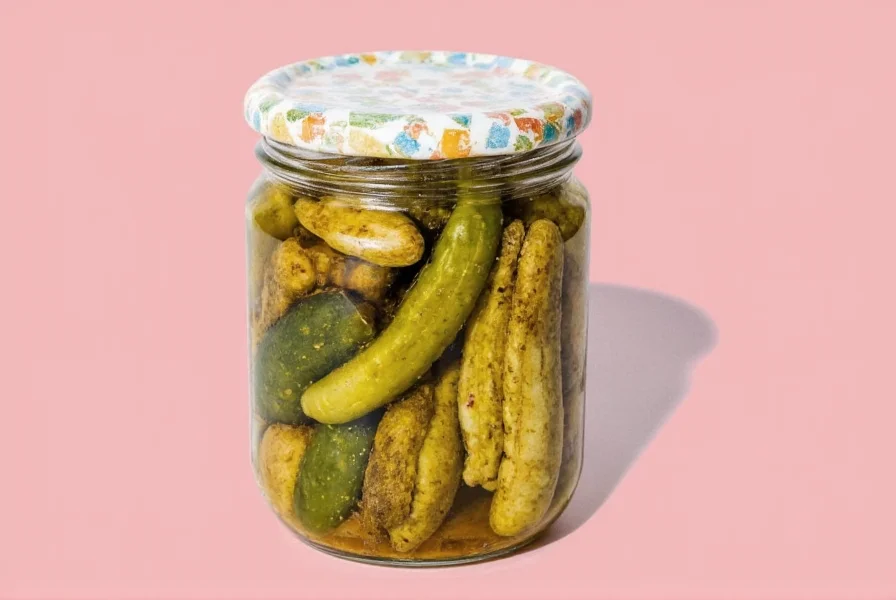Properly storing spices is crucial for making flavorful pickles. Whether you're fermenting cucumbers or creating spicy kimchi-style brines, the freshness and potency of your spices directly impact the final taste. In this guide, we'll show you exactly how to store pickling spices for maximum flavor retention, prevent common mistakes, and ensure your pickles always turn out delicious.
Why Spice Storage Matters for Pickles
When spices degrade due to improper storage, they lose volatile oils and aromatic compounds that create complex flavors in pickles. Stale spices result in flat, one-dimensional pickles that lack the bright, layered taste you expect. Here's what happens when spices aren't stored correctly:
- Heat exposure causes essential oils to evaporate within weeks
- Light exposure breaks down color compounds and accelerates oxidation
- Moisture leads to clumping, mold growth, and flavor degradation
- Air exposure oxidizes ground spices 3x faster than whole spices
Storage Methods for Pickling Spices
| Spice Type | Optimal Container | Shelf Life | Special Considerations |
|---|---|---|---|
| Whole Spices (mustard seeds, peppercorns, dill seeds) | Amber glass jars with tight-sealing lids | 3-5 years | Store away from heat sources; whole spices retain potency longer than ground |
| Ground Spices (paprika, turmeric, cumin) | Airtight ceramic or BPA-free plastic containers | 1-2 years | Buy in small quantities; ground spices lose potency quickly when exposed to air |
| Fresh Herbs (dill, cilantro, parsley) | Glass jars with damp paper towels | 1-2 weeks | Freeze chopped herbs in olive oil cubes for longer-term use |
| Spice Blends (pickling spice mixes) | Dark glass bottles with screw caps | 6-12 months | Label with creation date; avoid moisture contamination during mixing |
| Infused Vinegars/Oils | Dark glass bottles with tight seals | 6-12 months | Store in cool, dark place; refrigerate after opening |
Top 5 Spice Storage Mistakes for Pickling
- Storing near heat sources - Keep spices away from stoves, ovens, and dishwashers. Temperature fluctuations accelerate degradation.
- Using clear glass containers - Light exposure breaks down flavor compounds. Always use amber or opaque containers for long-term storage.
- Leaving spices in original packaging - Most spice bags and jars aren't airtight. Transfer to proper containers immediately after purchase.
- Adding moisture to containers - Never use wet spoons to measure spices. Moisture causes clumping and mold growth.
- Storing ground and whole spices together - Ground spices oxidize faster. Store them separately in appropriate containers.
Spice Preparation for Pickling
Proper preparation maximizes flavor extraction during pickling:
- Toasting whole spices - Dry roast mustard seeds, peppercorns, or fennel for 2-3 minutes to unlock aromatic oils before adding to brine
- Using cheesecloth bundles - Place whole spices in a small cheesecloth pouch to prevent sediment in pickles and simplify removal
- Measuring by weight - Use a digital scale for precise measurements (grams) rather than volume measurements for consistent flavor
- Creating pre-portioned kits - Prepare individual spice kits for your favorite pickle recipes to save time and ensure consistency
Frequently Asked Questions About Pickling Spices
How do I know when my pickling spices have gone bad?
Check for these signs: 1) Loss of vibrant color (paprika turning dull brown), 2) Faint or absent aroma when crushed, 3) Clumping or visible mold. Whole spices last longer than ground, but if they've lost their characteristic scent, they've lost most of their flavor potential.
Can I store pickling spices in the refrigerator?
Generally no. Refrigerators introduce moisture and temperature fluctuations that degrade spices faster. The only exception is fresh herbs (like dill), which should be stored in the fridge with damp paper towels. All dry spices should be kept in cool, dark, dry places away from humidity sources.
Why do my pickles become cloudy when using certain spices?
Cloudiness typically comes from mineral content in water or improper spice handling. To prevent this: 1) Use distilled or filtered water for brine, 2) Place whole spices in cheesecloth bundles instead of loose in jars, 3) Avoid ground spices in fermentation pickles (save them for quick pickles), and 4) Let brine cool completely before pouring over vegetables.
How long should I store spices before using them for pickling?
For maximum flavor, use whole spices within 12-18 months and ground spices within 6-12 months of purchase. Spices don't "go bad" but lose potency over time. If you notice reduced aroma or flavor during pickling, it's time to replace them. Always store spices properly to extend their usable life.
What's the best way to store fresh dill for pickling?
For short-term storage (1-2 weeks), place fresh dill stems in a glass of water like flowers, cover loosely with a plastic bag, and refrigerate. For longer storage, chop dill and freeze in olive oil cubes. When using for pickles, add fresh dill during the last 24 hours of fermentation to preserve its bright flavor.











 浙公网安备
33010002000092号
浙公网安备
33010002000092号 浙B2-20120091-4
浙B2-20120091-4